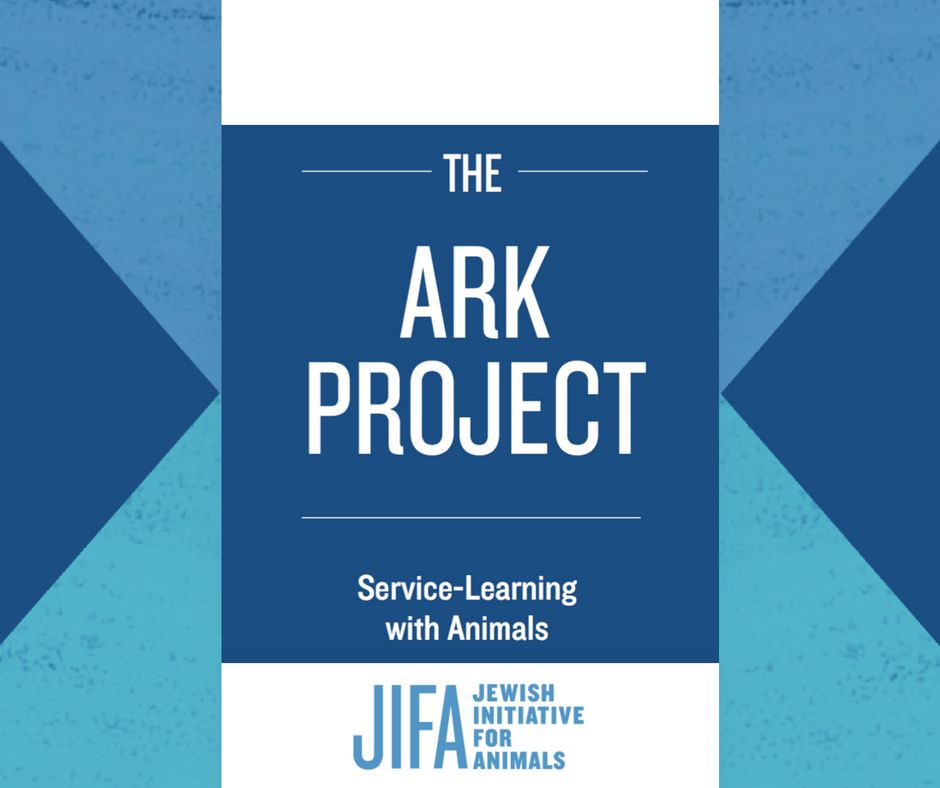If you’re a Jewish parent, educator, or clergy person who’s shepherded more than one 11 or 12 year old through the bar/bat mitzvah preparation process, you’ve likely heard this answer when asking them what they’d like to focus on for their community service or mitzvah project:
Animals.
JIFA’s most common email inquiries include questions about Jewish educational materials and animals. Early on, we recognized the demand for animal-related curriculum in particular from parents and tutors looking for resources on animal welfare, a topic near to their students’ hearts. Students everywhere have likely performed a compassionate or humane act without recognizing its Jewish significance—choosing not to eat certain animal products, cleaning up trash on the beach so it doesn’t end up around the neck or in the gullet of unsuspecting wildlife, or adopting a shelter animal with their family.
The Ark Project, JIFA’s new service-learning curriculum for b’nai mitzvah students, takes this natural affinity for animals and allows students to now see it through the lens of their Jewish identity and their development into a responsible Jewish adult.
The Ark Project is unique in several ways, but these 7 make it particularly special:
- The Ark Project utilizes a service-learning model, which encourages students to address a real community need.
While a volunteer or community service project dedicates some time to a cause, a student is not necessarily looking at larger, systemic issues that need to be addressed. In service-learning, students combine learning, service, and reflection activities in order to synthesize their experience and address the broader problems animals face.
- The Ark Project is available both to individuals and groups of students.
JIFA has created an individual student workbook as well as a facilitator guide for Jewish adults who want to facilitate a cohort project. You can join an upcoming cohort project in your area or start your own.
- Using the curriculum as a framework, students can design an animal-related project around any number of welfare topics.
From factory farming to animal testing, there’s no limit to what topic a student can address in their project. The Ark Project curriculum includes a large list of sample topics and subtopics.
- The curriculum pulls together a wealth of Jewish sources from a variety of texts and traditions.
From biblical to Talmudic texts to medieval sources to contemporary poets, The Ark Project provides a variety of Jewish teachings to give legal, philosophical, and theological context to the contemporary issues students will explore. Bonus: Every text in the book is displayed both in original Hebrew and English translation.
- Resources included in the curriculum guide students and adults in finding an appropriate animal organization with which to partner.
It can be difficult to find an organization to work with that really puts animal welfare first. The Ark Project gives students and mentors tools to locate and learn about an organization that will have existing projects or guidance for a novel project that truly supports animals’ well-being.
- The approach of this curriculum draws upon the fundamental concepts in humane education.
Comprehensive humane education encourages students to see injustices to animals, humans, and the environment as interconnected, so that actions to solve systemic problems really do benefit us all.
- The Ark Project allows Jewish students to put the lessons of their service into action.
Lest you think we created a curriculum for b’nai mitzvah students because that’s the age when animals are most interesting and relevant, we did something that will go quite beyond that…
Having made connections between their service-learning and their day-to-day life, students will go on to consider how they can live their values beyond their b’nai mitzvah preparation. Perhaps it’s with more plant-based food options at their b’nai mitzvah party. Perhaps it’s by helping their synagogue or school institute more humane and sustainable policies.
With these opportunities to engage with Jewish teaching and real life problems about topics that matter to them—homeless animals, animals used in entertainment, farmed animal welfare, conservation of wildlife, and so much more—students will expand their potential as dedicated Jewish community members and go on to be active adult animal advocates.




